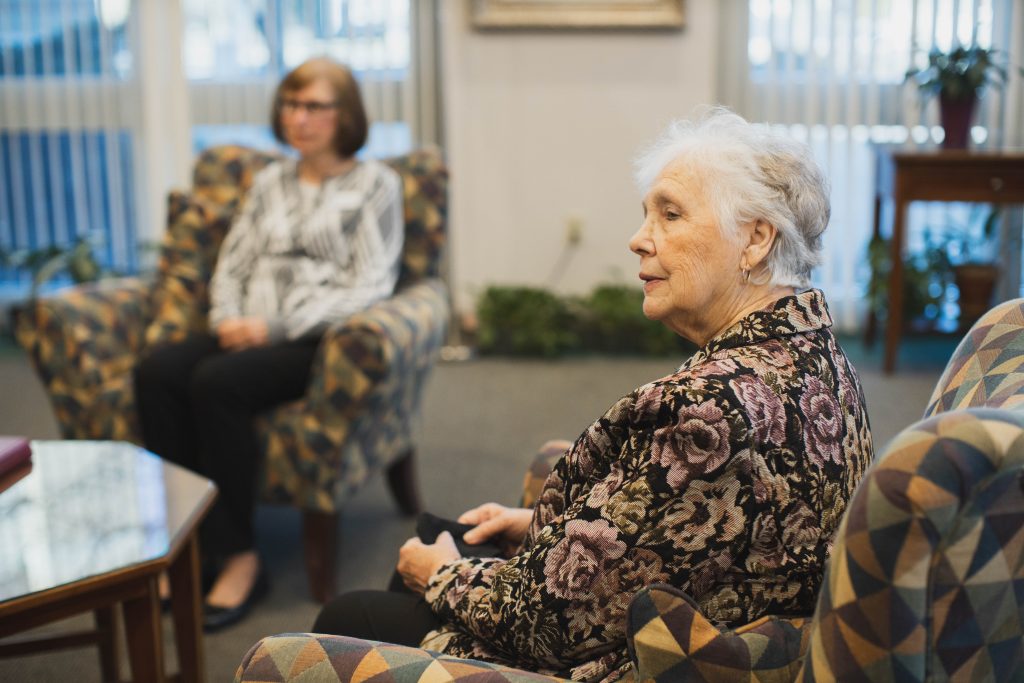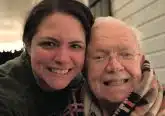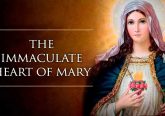The Compassionate Face of Jesus: IHM’s Bereavement Ministry
by Michelle Dushesnsky
Death is not a lighthearted topic of everyday conversation. Yet, it is something that unites us as human beings. All of us will face death – and, in the meantime, all of us will experience the death of loved ones.
Regardless of the circumstances, losing someone is painful. When God’s children are hurting and grieving, the Church has a unique and important opportunity to provide guidance and to minister to Her people — to be the face of Christ. For 37 years, that is exactly what the Immaculate Heart of Mary (IHM) Parish’s bereavement ministry has been – and continues to be – for its parishioners.
In 1984, IHM’s pastor asked parishioner Vivian Willging to be the facilitator of the parish’s grief support group. Her role evolved to include helping families plan funerals and being present at funeral Masses, which was the genesis of IHM’s bereavement ministry. Today, the nine-person ministry team, comprised mostly of volunteers, provides consolation, support, direct practical assistance and hope to individuals and families who have experienced the death of a loved one.
“Our main goal,” said Marisue Naber, PhD, RN, IHM’s pastoral associate of health ministries, “is to be the compassionate face of Jesus; to walk with people and to offer the best compassionate support that we can, trying to be the model that Jesus gave us.”
The dedicated bereavement ministers help people who are grieving select the elements of a prayerful and personal funeral Mass or memorial service. They serve as liaisons between the family and the priest, ministers, musicians and others, arriving at least an hour before the liturgy ensure correct setup. The ministry team assists in accessing resources before, during and after a death occurs. The ministers make a point to send cards to mourning individuals several weeks after the funeral to let family members know the parish is still praying for them and their deceased loved one.
Beyond offering support to those planning a funeral, Naber said, the bereavement ministry is important because it brings the community together. It also gives people the opportunity to practice the corporal and spiritual works of mercy, specifically burying the dead and comforting the sorrowful.
From offering prayers and attending the liturgy to reserving parking places and moving the paschal candle into the church, the entire parish and staff have the opportunity to come together to celebrate the life of a fellow parishioner. Pre-pandemic, people even donated homemade side dishes and desserts for funeral receptions.
Thanks to years of tremendous pastoral support, the bereavement ministry is well-grounded in the culture of the parish. Father Tom Kriedler, IHM’s current pastor of 13 years, is more than willing to change his calendar in practically any way to accommodate funerals and minister to his parishioners. (Naber said “Compassion” is Father Kriedler’s middle name.) The deacons, too, clear their schedules to participate in funeral liturgies and the rite of committal.
“There are things we can do to walk with [people], to be the face of the Lord to them,” said Father Kriedler. “All that goes together to show the community support for folks in their loss.”
Naber said the bereavement ministry is also important because it presents an opportunity to evangelize and catechize, not only through explaining the parts of a funeral Mass and why incense is important, but also conveying Catholics’ belief in life after death – in the resurrection.
“When you sit down to plan a liturgy with someone who may not be as familiar with all the parts [as you are], you have that opportunity to explain a few things,” said Naber. “I particularly like it when they bring children, because many young adults or young people or grandchildren have no idea what the liturgy is going to look like. . . We try to talk about the Mass as a way of celebrating a person’s life. It’s really about embracing the paschal mystery. I just love to have that opportunity to explain our faith and hopefully make the experience more meaningful to them.”
Father Kriedler said what gives meaning and hope is the presence of the Lord.
“The Lord is with us in the good times and the bad times. That presence during those toughest of times is something that is key and is what we’re about.”
This article appeared in the April 2021 edition of The Catholic Telegraph Magazine. For your complimentary subscription, click here.














